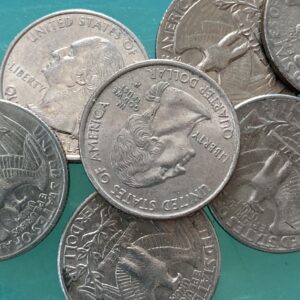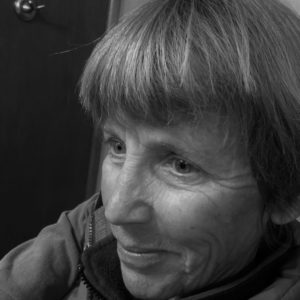 Every summer I make a pilgrimage to New England where I did some of my growing up. In a rented car I drive the familiar roads of Massachusetts and Maine, reacquainting myself with humidity and the color green. The farther north I go the fewer people there are, and along the coast the air cools and becomes salty. I don’t pull off the highway to find a bowl of fish chowder or a lobster roll, though I wish I were the kind of person that did that even just once. One thing I’ve learned about travel is it puts you right up against who you are, which is maybe not who you wish to be, and the width of that difference is something you can string a bridge across, or take a long look at and shake your head. A new persona? Here’s your chance. It’s up to you.
Every summer I make a pilgrimage to New England where I did some of my growing up. In a rented car I drive the familiar roads of Massachusetts and Maine, reacquainting myself with humidity and the color green. The farther north I go the fewer people there are, and along the coast the air cools and becomes salty. I don’t pull off the highway to find a bowl of fish chowder or a lobster roll, though I wish I were the kind of person that did that even just once. One thing I’ve learned about travel is it puts you right up against who you are, which is maybe not who you wish to be, and the width of that difference is something you can string a bridge across, or take a long look at and shake your head. A new persona? Here’s your chance. It’s up to you.
Usually I stay on the big roads, the interstates and turnpikes, not because I need to get anywhere faster, but for one simple reason. I know this sounds strange, but I like tollbooths. Tollbooths are the reward for miles traveled. They’re like little islands of human contact in an ocean of vehicles accelerating away from one another. For some reason, New England tollbooths are manned by actual people. When I was a kid there was a stretch of years when instead of handing money to a tollkeeper, you tossed your quarters into a basket, and as soon as the gate lifted you sped on through. If the person ahead of you missed the basket, which was hard to miss, there would be a symphony of honking and shouting and shaming while the person got out of their vehicle and searched the ground for their coins. New Englanders, it goes without saying, have a lively relationship with shame.
My first car was a gray Toyota station wagon I bought from my younger brother. I think he took the money and bought a motorcycle. It doesn’t seem right that he had a car before I did, but I was slow to learn to drive, having lived in cities most of my life. I liked public transportation. I enjoyed riding the subway, the train, the bus. That’s where I developed the skill of observation. People were interesting and their lives were different from mine, and whether or not the stories I made up about them were actually their stories didn’t matter. A car, on the other hand, was a place to be alone. It was a moving unit of solitude.
The first time I drove the gray Toyota south on the Maine Turnpike, I hadn’t yet mastered its gearshift, its four-on-the-floor. First gear was the troublemaker; the rest were pretty smooth and easy. Starting from a cold stop and moving into first, I stalled every time, but if I could avoid stopping, I was all set. Alas, on my southward journey there were tollbooths. A few of them had baskets and my method was to open the window well in advance and throw my handful of coins in the right direction without slowing down. But the tollbooths manned by humans were impossible. There was no getting around the full stop to interact with the hand extending from the booth, awaiting my fare. After one or two prolonged stalls and the subsequent honking behind me as I tried and failed to start up again, I decided there was only one solution. I would rocket on through the tollbooth while shouting, “Can’t stop! Can’t stop!” There must not have been gates in that particular era of tollbooths, because this technique was successful. I don’t recall any alarms sounding or any physical damage done to government property, just some incredulous looks from a few tollkeepers who had never witnessed that stunt before.
Those who man the tollbooths have always reminded me of lighthouse keepers. Every car that rolls by is a new and distinct wave upon the tollkeeper’s shore. I’d like to know what it’s like—I can only imagine—to watch hands and bills and coins unfolding from vehicle after vehicle; to say “Have a nice day” over and over, or “That’s the next exit up,” or “You can’t get there from here.” It seems the opposite of the lighthouse keeper’s solitude, when in fact it’s as solitary as a job can be. Alone in a booth, providing company to one driver after another for the blink of an eye before they’re gone, like gulls to the man in the lighthouse. There’s the engine noise, the smell of exhaust, the sharp clink of coins and the worn feel of the bills. All that money reduced to clinks and paper, the currency of our lives nothing more or less than what passes between two human beings in the space of a second or two.
There’s a lesson about strangers in this story, and how we choose to see each other at the briefest crossing of our life with someone else’s. On a recent expedition along the New England roads, I pulled up to a tollbooth with my money ready, two flat bills my ticket to the great unknown ahead. The tollkeeper smiled. He was wearing a T-shirt that said Ask Me Anything and I wished I’d thought of a question for him. He turned back my money and said, “The guy ahead of you paid it forward. Go on through.”
I sat with that for the next several miles. Somebody unknown to me had reached out into the space between us and paid my toll. They’d made a fine connection. It had cost them only a couple of dollars and here I was, carrying their generosity still. If I were going to try on a new persona, pay it forward seemed a good place to start. At the next tollbooth I handed the keeper the toll for two and told him, “That’s for me and the next guy.”

